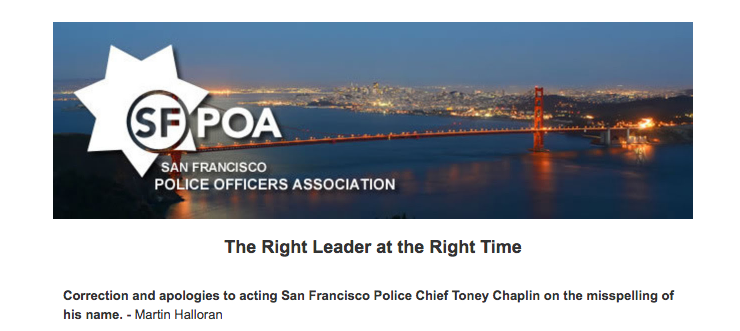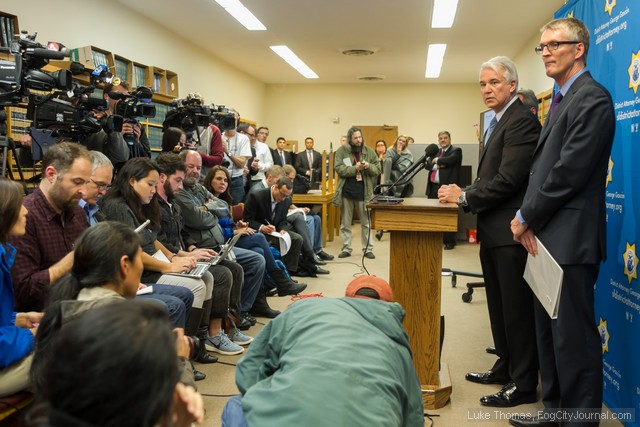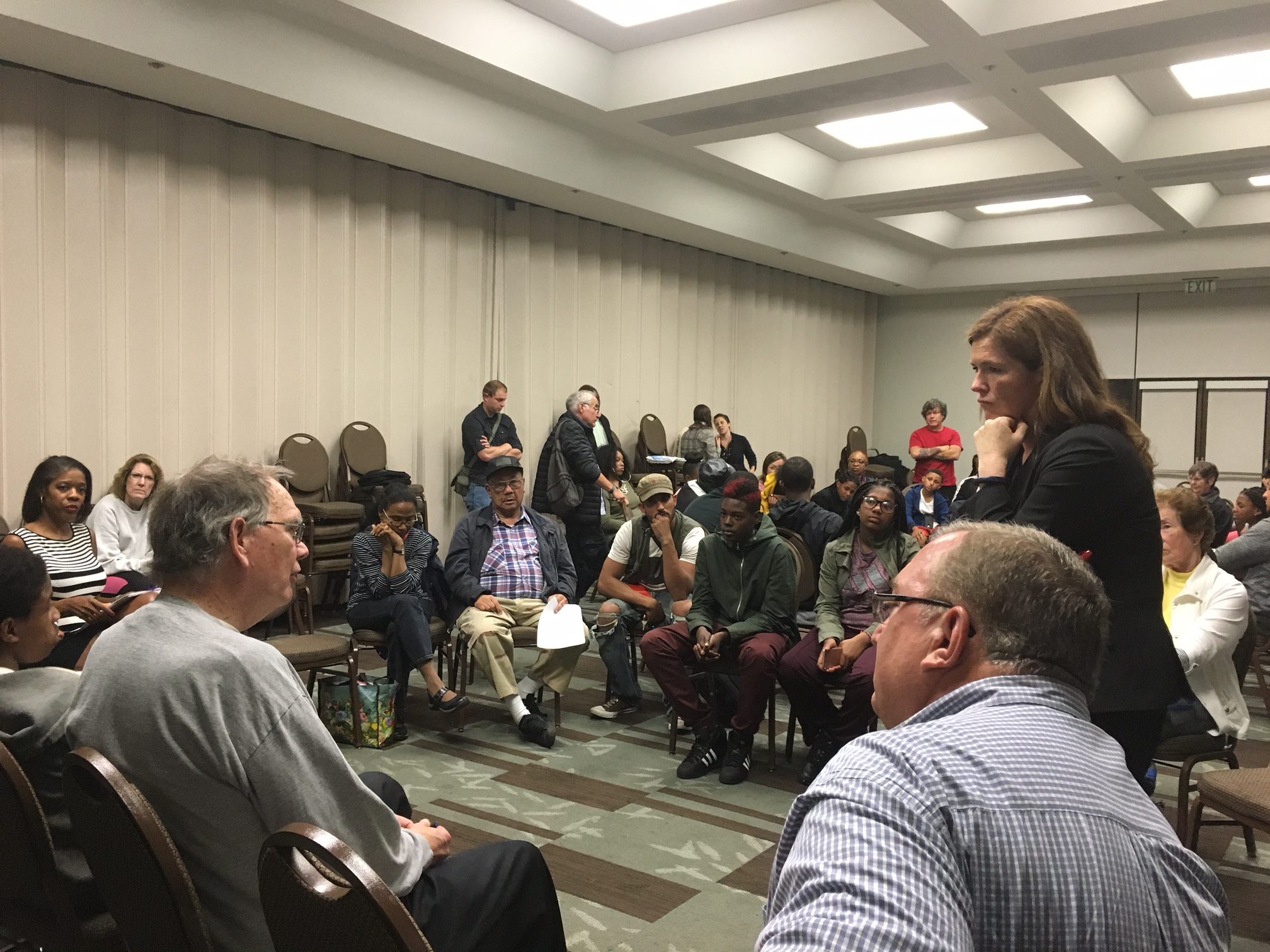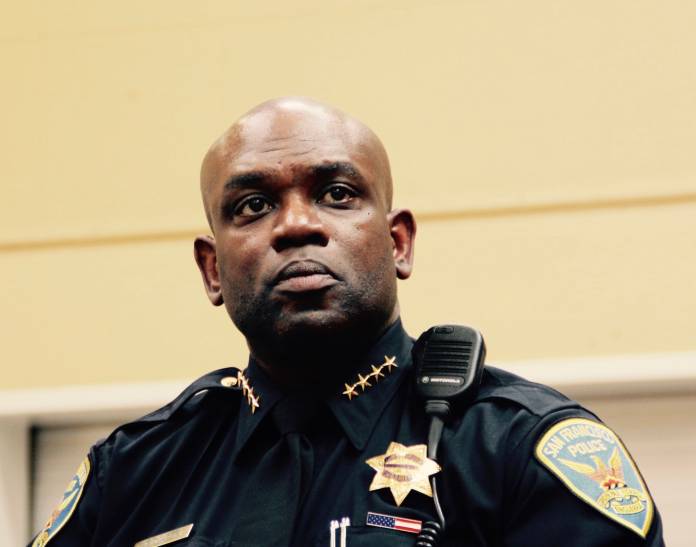The deadline for applications for the job of San Francisco police chief closed Wednesday, and because the process is not exactly open, it’s hard to know how many of the potentially qualified candidates from outside the city decided to apply.
But we know that the mayor has made statements suggesting that he favors the existing acting chief, and the police union is running a paid campaign– and none of that is likely to encourage the kind of outside reformers that the city so badly needs.
The POA began running radio ads last week supporting Chaplin and urging the commissioners and the mayor to give him the permanent job. The ads are stunning in their attempts to say that only a San Francisco police officer, someone who started here (and was, by definition, a member of the POA) should be eligible for the job.

In the process, the union excoriates former Mayor George Moscone and his choice of a police chief, Charles Gain, who came from the outside. “In the 1970s, the city made a huge mistake” in hiring Gain, who “had no credibility,” the ads say.
Actually, Gain was trying to reform the department under a progressive mayor – in particular, trying to bring more women and people of color into the force, something that the POA actively, aggressively fought.
He had the police cars painted a soft blue so they would look less imposing and tried to modernize management at a department run by an old boy’s club for generations.
A lot of the older, white cops hated him – and in fact, the POA remains today proud of its role in fighting the integration of the department. In November, 2014, a former union president (eulogizing the late Jerry Crowley) noted:
Shortly after [Crowley] becoming President in 1973, the Officers for Justice along with a large group of minority and women’s groups sued the city to ensure more diversity in the Police Department, and to compensate incumbent minority officers for discrimination. . . . The story that is rarely told is the role of the POA — and particularly Jerry Crowley — in derailing the first consent decree in 1978. In 1978, President Jimmy Carter’s Justice Department and Mayor George Moscone fashioned a proposed consent decree on hiring and promotions that would have wrecked the SFPD. … Crowley the leader again sprung into action by hiring new lawyers, fashioning a federal litigation committee of POA members, and engaging in political action to stop the original decree. Hundreds of hours of work highlighted the POA involvement along with financial assessments of the membership to fight in court.
An agreement that would have mandated more women and people of color in management positions would have “wrecked the department,” according to the POA – not the POA in 1973, but the POA today.
Help us save local journalism!
Every tax-deductible donation helps us grow to cover the issues that mean the most to our community. Become a 48 Hills Hero and support the only daily progressive news source in the Bay Area.
After Moscone and Sup. Harvey Milk were assassinated, Mayor Dianne Feinstein fired Gain and brought the old insiders’ club back.

The ad also says the city made a mistake hiring George Gascon in 2009, who “apparently had little interest in our department, leaving after only a few months for political gain.” Actually, Gascon was hired in August of 2009 and served as chief until January 2011. And at the time, the POA seemed to be fine with him
In March 2011, POA President Martin Halloran wrote:
Chief Gascon introduced to the dusty traditions of the SFPD many fresh-air innovations that should have been implemented years ago. While “CompStat” is new to our department, its existence in most major police departments is old news. The de-centralization of the Inspectors Bureau was also long overdue, as every major police department in the United States has some investigative presence among its patrol force. He pushed hard for Tasers and I believe we will see them distributed to our patrol officers very soon. He was the best I have ever seen at getting out in front of a police shooting before the press took off with their own version of events. He was more then (sic) fair on discipline, and was an advocate of “Education-Based Discipline,” an innovation that provides for re-training for minor first-time infractions. He was an effective, charismatic speaker who gained the immediate respect of the public and politicians alike.
But once Gascon became district attorney and started to criticize the department, the POA turned on him, and now says his hiring was a mistake.
The POA, says longtime police accountability activist, John Crew, is
obviously petrified by the possibility that a highly-qualified, reform-minded, experienced candidate from outside the SFPD — which describes at least some of the people who’ve applied — could soon be running the SFPD, our SFPD, not their SFPD. Like any other well-funded special interest, the “bad cop lobby” is pulling out all the stops to try to protect their own prerogatives and outsized influence over everything related to the SFPD — from hiring, to promotions, to accountability, to weaponry and use of force tactics and policies, to public safety strategies… everything. They want to preserve a status quo that benefits the most aggressive and misconduct prone officers among their membership and that involves an increasingly archaic style of policing — causes that they have chosen to make their top organizational priorities for many years now.
More from Crew, former police practices lawyer at the Northern California ACLU:
This is a pivotal moment. The SFPD is in the process of recruiting and training academy classes that will bring 400 new police officers into the force in the months and years ahead. Those officers and their behaviors will come to define policing in San Francisco for a generation. If they spend their formative years in the SFPD under a chief of police chosen by the SFPOA and completely beholden to them for his job (because their support is literally his only qualification for it), the bad habits they’ll learn, the “us vs. them” culture they’ll absorb, and the skewed “circle the wagons” mentality that causes them to support bad cops and worse policing over the clear public interest will doom our communities to just more of the same — more of what we’ve come to expect from the SFPD in the Suhr years — far into the future.
As for Chaplin – well, the fact that the POA wants him ought to be grounds enough to say he’s not qualified. But based on the city’s own criteria, he really isn’t.
Running the SFPD is not the same as being a beat cop (or a “cop’s cop,” as the POA describes Chapin.) We’re talking about a huge operation, with more than 2,000 employees, sworn and civilian, and a budget of $577 million.
Most big-city police chiefs have at least five, and more commonly ten or 15, years in management, and many of them have post-graduate degrees in related areas. Chaplin just finished his BA in June, has never been a captain, and has served in management for only a very short period of time. He doesn’t have the experience that the city’s own job notice asks for.
Remember: The chief isn’t pulling over bad guys. He’s running a big, complex operation and setting the tone for a department that is in very serious trouble.
Over the past few weeks, the Police Commission held multiple community “listening” sessions to help understand what community members demand in a new police chief.

At the last listening session, at St. Mary’s Cathedral, more than a dozen community members gathered to voice their concerns and provide suggestions on what they would like to see in a new police chief. These ranged from “love for the city” to “ability to stop racial profiling.” Commissioners diligently noted them down.
How helpful have the sessions been in building confidence in the community? President Suzy Loftus told us she thinks the sessions have been instrumental. “In the past we have had three community meetings and this type of community meetings where someone stands on this side of the table and folks stand up, I think part of what we have done is create a community conversation.” Loftus said she thinks that the new police chief should be able to look at the larger picture: “Someone who is willing to really take a long look at 21st century policing. Everything from training, to hiring, recruiting and insure that everything that we do in San Francisco is really leading the way of being a progressive, safe and just city.”
At the St. Mary’s session, community activist David Carlos Salaverry said that “many of us think this is a sham, that Tony Chaplin has the blessing of the POA and the mayor.”
The big question that the Police Commission will face as it evaluates the field of candidates is: Can someone who has spent a career rising through what pretty much everyone agrees is a toxic culture at SFPD possibly lead the kind of dramatic reforms that are needed?
Can an outsider who takes the reigns at a department historically hostile to outsiders get the support he or she needs to overhaul the department’s policies and politics?
Will the mayor and the commissioners he has appointed be willing to hire and support an outsider who wants to shake up the SFPD?
Did Lee and Loftus make enough of an effort to reach out and recruit candidates from outside the department? Or has the general impression out of City Hall – that the fix is in, that the next chief will come from within the ranks – spread nationwide and discouraged good candidates from applying?
Loftus has strong faith in the process: ” This process is designed to get the best absolute possible police chief for San Francisco and the commissions job is to advance up to three great candidates to the mayor. I think myself and my fellow police commissioners take that very seriously and are going out there and doing this process and getting interest across the country and within the police department from people who believe they’re up for the job. This has been a full and robust process, multiple meetings and multiple outreach.”
Commissioner Petra DeJesus is deeply concerned about the POA’s campaign: “I am concerned about the intention behind the POA’s campaign. Are they trying to deter others from the process or are they trying to influence the mayor and the commission through public opinion? I am looking forward to reviewing the applications and conducting the interviews because San Francisco deserves the best candidate as the next chief, whomever that may be. The POA needs to allow the process to proceed and let the commissioners do their job,”
And will the commissioners – the majority of whom are appointed by the mayor – make public the three finalists they forward, and conduct an open process that gives the community confidence that the next chief won’t be another pawn of the POA?
Commissioner Victor Hwang told us that one of the most important attributes of the new police chief should be independence from powerful interest groups such as the POA: “We want somebody who is going to be independent and able to stand up to the political forces whoever they are, whether it is the POA, whether it is the board of supervisors, whether it is the police commission and implement their vision of reform for our city,” Hwang told 48Hills.
It’s astonishing that the police union would say, without any idea who the outside candidates are, that nobody anywhere in the country is more qualified than the POA’s internal candidate. We know there are reformers, qualified people, out there, and some of them may have applied for the job — and if the mayor and the commission ignore them, it will be politics, and business, as usual at SFPD.





